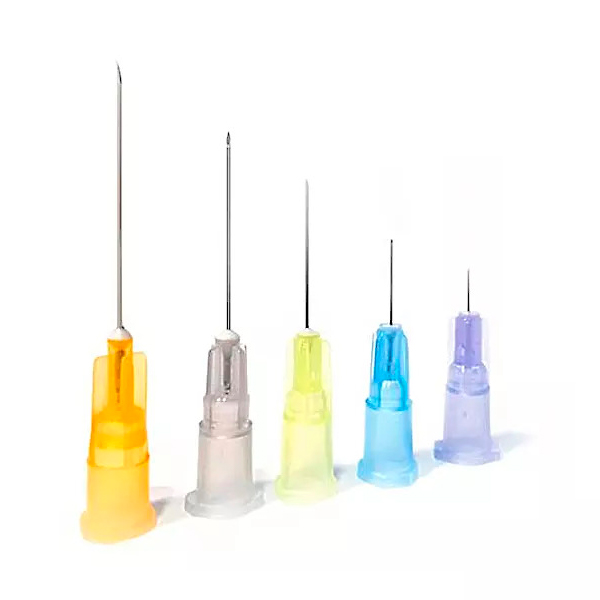Medical Hypodermic Needles Market size was valued at USD 5.63 Billion in 2023 and is expected to reach USD 9.50 Billion by the end of 2030 with a CAGR of 4% during the forecast period 2024-2030.
The medical hypodermic needles market involves the production and sale of needles used for various medical procedures, including injections, blood draws, and vaccinations. These needles are essential tools in healthcare, providing a means for delivering drugs and vaccines, withdrawing fluids, and conducting other medical procedures. With the rise of chronic diseases, vaccinations, and increased healthcare access, the demand for hypodermic needles continues to grow.
Market Trends
- Rising Demand for Vaccinations and Immunization Programs: Global immunization programs, especially in response to infectious diseases like COVID-19, have significantly increased the use of hypodermic needles. This trend is expected to continue, particularly as efforts to immunize populations against diseases such as influenza, hepatitis, and human papillomavirus (HPV) expand.
- Growing Prevalence of Chronic Diseases: With increasing cases of chronic diseases such as diabetes, cancer, and autoimmune diseases, there is a rising need for hypodermic needles for both diagnostics and therapeutic interventions. Diabetics, for example, require insulin injections, driving demand for these needles.
- Shift Towards Safety and Retractable Needles: To reduce the risk of needlestick injuries and the transmission of blood-borne pathogens, there is a growing demand for safety needles and retractable hypodermic needles. These devices improve healthcare worker safety by minimizing accidental exposure to contaminated needles.
- Technological Advancements: Innovations such as microneedles and painless needles are being developed to improve patient comfort and compliance. These new types of needles aim to reduce pain, particularly for children or those with needle phobias.
- Increasing Home Healthcare and Self-Administration: As healthcare shifts towards home-based care, especially for chronic diseases like diabetes, there is a growing market for hypodermic needles that patients can use safely on their own for self-administration of medications.
Market Dynamics
Drivers
- Increased Demand for Vaccinations: Global immunization efforts, including large-scale vaccination campaigns for diseases like COVID-19, influenza, and measles, are a key driver of hypodermic needle demand.
- Rising Incidence of Chronic Diseases: The growing number of people with conditions requiring regular injections, such as diabetes and cancer, continues to drive the need for medical hypodermic needles.
- Advancements in Safety and Design: The development of safety-engineered needles, such as auto-disable needles and retractable needles, is increasing adoption rates, especially in hospitals and clinics focused on reducing the risk of needlestick injuries.
- Growth in Home Healthcare: As more patients receive care at home, there is an increasing demand for hypodermic needles designed for self-administration of medications, such as insulin and hormone therapies.
Restraints
- Needlestick Injuries and Risks: Despite the adoption of safety needles, needlestick injuries remain a concern, particularly in under-resourced healthcare settings. The fear of accidental needlestick injuries and the risk of transmitting infections like HIV and hepatitis pose challenges.
- High Costs of Safety Needles: Safety needles, while essential for preventing injuries, tend to be more expensive than conventional needles. This can limit their widespread adoption in cost-sensitive markets, especially in developing countries.
- Stringent Regulatory Requirements: The medical device industry is subject to stringent regulatory requirements regarding safety and quality. Compliance with these regulations can delay the introduction of new hypodermic needle designs and increase production costs.
Opportunities
- Emerging Markets: Expanding healthcare infrastructure and increasing government investment in healthcare in emerging economies such as India, China, and Brazil provide opportunities for growth in the hypodermic needle market.
- Technological Innovations: Continued innovations in needle design, such as painless injection technologies, microneedles, and auto-disable devices, offer new growth opportunities for manufacturers.
- Partnerships for Vaccination Programs: Partnerships between hypodermic needle manufacturers and governments or non-governmental organizations (NGOs) for large-scale immunization programs can provide significant growth opportunities, particularly in regions with a high disease burden.
Challenges
- Disposal and Environmental Impact: The disposal of used hypodermic needles presents a challenge due to the risk of contamination and environmental impact. There is increasing demand for sustainable and eco-friendly disposal methods.
- Alternative Drug Delivery Methods: The development of alternative drug delivery technologies, such as needle-free injectors, transdermal patches, and oral biologics, could reduce the demand for hypodermic needles in some therapeutic areas.
Conclusion
The medical hypodermic needles market is set to experience steady growth in the coming years, driven by increasing global vaccination efforts, rising prevalence of chronic diseases, and technological advancements in needle design. The shift toward safety-engineered needles and the expansion of home healthcare services are creating new opportunities for market players. However, challenges such as needlestick injuries, high costs of safety needles, and the rise of alternative drug delivery methods need to be addressed. Emerging markets offer significant potential for growth as healthcare access continues to improve and vaccination programs expand globally.
Click Here, To Get Free Sample Report https://stringentdatalytics.com/sample-request/medical-hypodermic-needles-market/18584/
Market Segmentations:
Global Medical Hypodermic Needles Market: By Company
BD
Cardinal Health
Terumo
- Braun
Smiths Medical
Novo Nordisk
Nipro
Yangzhou Medline
DeRoyal
Retractable Technologies
Global Medical Hypodermic Needles Market: By Type
Safety Needle
Non-Safety Needle
Global Medical Hypodermic Needles Market: By Applications
Hospital
Clinic
Other
Global Medical Hypodermic Needles Market: Regional Analysis
The regional analysis of the global Medical Hypodermic Needles market provides insights into the market’s performance across different regions of the world. The analysis is based on recent and future trends and includes market forecast for the prediction period. The countries covered in the regional analysis of the Medical Hypodermic Needles market report are as follows:
North America: The North America region includes the U.S., Canada, and Mexico. The U.S. is the largest market for Cold-chain Pharma in this region, followed by Canada and Mexico. The market growth in this region is primarily driven by the presence of key market players and the increasing demand for the product.
Europe: The Europe region includes Germany, France, U.K., Russia, Italy, Spain, Turkey, Netherlands, Switzerland, Belgium, and Rest of Europe. Germany is the largest market for Cold-chain Pharma in this region, followed by the U.K. and France. The market growth in this region is driven by the increasing demand for the product in the automotive and aerospace sectors.
Asia-Pacific: The Asia-Pacific region includes Singapore, Malaysia, Australia, Thailand, Indonesia, Philippines, China, Japan, India, South Korea, and Rest of Asia-Pacific. China is the largest market for Cold-chain Pharma in this region, followed by Japan and India. The market growth in this region is driven by the increasing adoption of the product in various end-use industries, such as automotive, aerospace, and construction.
Middle East and Africa: The Middle East and Africa region includes Saudi Arabia, U.A.E, South Africa, Egypt, Israel, and Rest of Middle East and Africa. The market growth in this region is driven by the increasing demand for the product in the aerospace and defense sectors.
South America: The South America region includes Argentina, Brazil, and Rest of South America. Brazil is the largest market for Cold-chain Pharma in this region, followed by Argentina. The market growth in this region is primarily driven by the increasing demand for the product in the automotive sector.
Click Here, To Buy Premium Report https://stringentdatalytics.com/purchase/medical-hypodermic-needles-market/18584/?license=single
About Stringent Datalytics
Stringent Datalytics offers both custom and syndicated market research reports. Custom market research reports are tailored to a specific client’s needs and requirements. These reports provide unique insights into a particular industry or market segment and can help businesses make informed decisions about their strategies and operations.
Syndicated market research reports, on the other hand, are pre-existing reports that are available for purchase by multiple clients. These reports are often produced on a regular basis, such as annually or quarterly, and cover a broad range of industries and market segments. Syndicated reports provide clients with insights into industry trends, market sizes, and competitive landscapes. By offering both custom and syndicated reports, Stringent Datalytics can provide clients with a range of market research solutions that can be customized to their specific needs.
Contact Us
Stringent Datalytics
Contact No- +1 346 666 6655
Email Id- sales@stringentdatalytics.com




Leave a Reply